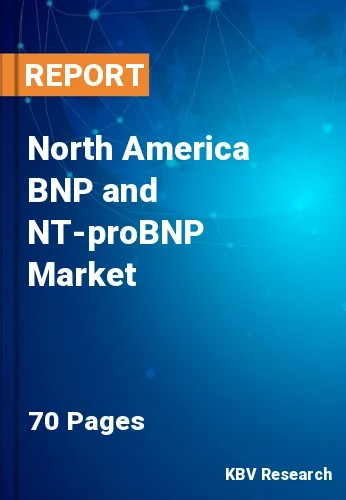The North America BNP and NT-proBNP Market would witness market growth of 10.1% CAGR during the forecast period (2022-2028).
Non-cardiogenic and cardiogenic origins of dyspnea in an emergency is the strongest rationale for BNP monitoring. In substantially all cases of CHF aggravation, dyspnea is a symptom. It is not, however, exclusive to CHF and might be brought on by other pathologic diseases. About 97% of patients with heart failure can be detected with BNP. Thus, a healthy BNP level should stimulate an investigation for noncardiac explanations of dyspnea and essentially rule out heart failure.
Conversely, an increased level of BNP may signal the existence of heart disease and the requirement for additional cardiac testing, such as echocardiography, to identify the cause of the patient's condition. Longer hospital stays have also been linked to short-term increases in hospitalized individuals with CHF. Individuals with greater New York Heart Association operational class scores have elevated levels of BNP, which are associated with morbidity and mortality as well as repeated hospitalization.
BNP can also be a helpful prognostic marker in people with known CHF. Also, it has been demonstrated that short-term BNP spikes predict longer hospital stays in hospitalized heart failure patients. A key factor in mortality after myocardial infarction (MI) is left ventricular (LV) dysfunction brought on by cardiac remodeling. In patients experiencing post-MI LV dysfunction and ejection fractions 40%, BNP becomes increased, which makes it possible to monitor BNP to assess prognosis after MI.
The Pan American Heart Organization (PAHO) estimates that cardiovascular diseases (CVD) in this region result in 40.8 million DALYs (disability-adjusted life years) each year. 89% of all CVD DALYs were due to premature deaths. Due to population expansion and aging, there will likely be an increase in the overall number of CVD fatalities in the coming years. The two primary underlying illnesses that result in death and disability from CVD are ischemic heart disease (IHD) and stroke. Nearly all of the region's non-high-income countries are experiencing an increase in the burden of CVD, and frighteningly, the age-standardized cardiovascular disease rate has started to increase in many regions where it had been dropping. The regional market would expand as a result of this factor.
The US market dominated the North America BNP and NT-proBNP Market by Country in 2021, and would continue to be a dominant market till 2028; thereby, achieving a market value of $547.4 Million by 2028. The Canada market is poised to grow at a CAGR of 12.2% during (2022 - 2028). Additionally, The Mexico market would witness a CAGR of 11.9% during (2022 - 2028).
Based on Location of Testing, the market is segmented into Point of Care Testing and Laboratory Testing. Based on Application, the market is segmented into Myocardial Infarction, Acute Coronary Syndrome (ACS), Congestive Heart Failure (CHF) and Others. Based on countries, the market is segmented into U.S., Mexico, Canada, and Rest of North America.
Free Valuable Insights: The Worldwide BNP and NT-proBNP Market is Projected to reach USD 2.2 Billion by 2028, at a CAGR of 11.4%
The market research report covers the analysis of key stake holders of the market. Key companies profiled in the report include Abbott Laboratories, Siemens AG, Danaher Corporation, Gentian Diagnostics ASA, PerkinElmer, Inc., BioMérieux S.A., Quidel Corporation, Bio-Rad Laboratories, Inc., F. Hoffmann-La Roche Ltd. (Roche Holding Ltd.), and Scripps Laboratories.
By Location of Testing
By Application
By Country
Our team of dedicated experts can provide you with attractive expansion opportunities for your business.

